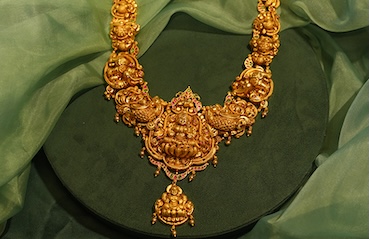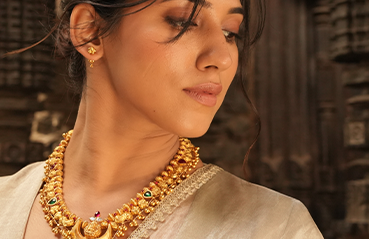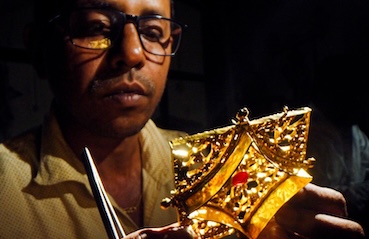Published: 19 Jun 2018
Gold and Hinduism
The holy scriptures of Hinduism regard gold for its rarity, indestructibility and prosperity. Its aura, value and auspiciousness make it an irreplaceable component of Hinduism belief system.
Gold as a symbol of fortune and wealth
Gold is associated with the Hindu goddess ‘Lakshmi’, who is believed to bring prosperity and good fortune. Most imagery shows the goddess with her left hand lowered to the ground and dropping gold coins. The gold coins are believed to symbolise widespread fortune and prosperity rather than money i. While goddess Lakshmi has the power to bring good fortune in the lives of her worshippers, Lord Kubera is the god of wealth and the treasurer of the divine world ii.
Related: Finding Kubera: The treasurer of Gods
Kubera’s association with gold can be traced to him being the king of the Yakshas who are considered the guardians of treasures. Kubera is shown holding a golden mongoose in his hand that spits out gems every time it opens its mouth. In his other hand, he carries a pot of gold coins and sometimes a money bag.
It is also believed that Kubera built the golden city of Lanka. However, stepbrother Ravana, envious of Kubera’s prosperity, drove him out of the city. Kubera travelled northwards and settled close to Mount Kailas, in the Himalayas.iii Nevertheless, Lord Kubera is worshipped for wealth and a life of no financial crisis.
Related: Legends behind the golden city of Lanka
Gold and creation
Brahma, the deity of creation, is shown with a golden face and ornaments to accentuate his role as creator of the universe and life thereiniv v. However, that’s not it when it comes to beliefs about gold’s association with creation. There are references in Hindu scriptures to the Hiranyagarbha (the golden womb) in the context of the creation of life and universe. In one, Hiranyagarbha is the genesis of life and universe as it gave birth to Brahma; in another, the universe emerged out of the Hiranyagarbha; and then there is a hybrid belief which states that the egg split into heaven and earth after giving birth to Brahma vi vii viii ix x.
Related: The role of gold in the creation of the world
Gold and astrology
Hinduism believes precious metals are energy amplifiers and augment the embellishing gem’s potency in bringing a positive influence and energy in the wearer’s life. Gold has been held in high regard since ancient times for treating blood, skin, and heart ailments xi. To know more about gold’s role in medicine, read Gold and health.
Given that gold is a noble metal, i.e. resistant to corrosion and oxidation, it is believed to prevent spiritual fatigue and negativity. It is supposed to ward off tension, anger, and feelings of inferiority. Harnessing the sun’s energy, gold enhances spirituality and is believed to promote self-awareness and the realization of dreams ix.
Gold ornaments are generally worn on the upper part of the body because it positively influences the body’s energy forces and is considered beneficial for health. Among all metals, gold is strong in sattva – quality of goodness, positivity, truth, wholesomeness, serenity, wholeness, creativity, constructiveness, balance, confidence, peacefulness, and virtuousness that is drawn towards righteousness and knowledge xii. Sattva is one of the three guṇas (qualities), laid out by Hindu philosophy. The other two qualities are rajas (passion and activity) and tamas (destruction, chaos).
Hinduism believes gold has an association with the Tej (Fire) Tattva. Tattvas are the elements to understand the concept of god, the souls and the universe. According to Hindu belief, wearing gold ornaments channels the divine energy (Shakti) in the body of a woman. Therefore, Hindu scriptures recommend women adorn their forehead, ears, nose, neck and hands with gold ornaments in light of the metal’s positive influencexiii.
Related: Wearing 'Gold' jewelry is scientifically important for women
Gold and the afterlife
According to a verse in Atharvaveda, gold is created from the fire which bestows eternity, liberating its wearer from the fear of untimely passingxiv. As per Brahman Holy text, gold destroys the harmful germs present in the body xv xvi. Therefore, the religion requires for gold to be placed on the deceased to allow for a smooth transition of the body and soul through the last rites of passage.
Recognising gold’s positive properties and influence, Hinduism has rendered it a sacred position in the life of a Hindu.











